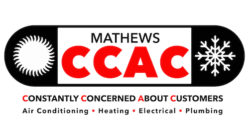
Refrigerant’s purpose is to carry heat energy. It does this through a sequence of phase changes: an evaporator coil inside your home turns the refrigerant from a liquid to a gas, just as water in a pot on your stove will turn to steam if enough heat is added. The warmed refrigerant is then pumped out to the outdoor component of your air conditioner — the condenser, which frees the heat from the refrigerant, warming the air around the unit. A fan then pushes the warm air away, and the cooled refrigerant is pumped back inside to begin the cycle again.
Your refrigerant charge — the amount of refrigerant in your system — is important, as both undercharging and overcharging can interfere with the proper phase changes inside your coil. However, because the coil is a closed system, the charge shouldn’t change from the time it’s installed.
If your air conditioner isn’t cooling as effectively as expected, it’s possible that the refrigerant wasn’t charged correctly when it was installed. If a recent problem has developed, however, it’s possible that the refrigerant line has sprung a leak, and should be examined by an HVAC professional.
Depending on when your unit was installed, you might have a different kind of refrigerant in the lines. Until recently, a refrigerant called R-22 was the most common in air conditioners. However, it’s being phased out due to environmental and health concerns, and no new R-22 will be produced or imported into the US after 2020.
If you’d like to learn more about how refrigerant works, or what you should do with a R-22 system, contact us today at CCAC!
Our goal is to help educate our customers in Corpus Christi, Texas about energy and home comfort issues (specific to HVAC systems). For more information about refrigerant and other HVAC topics, download our free Home Comfort Guide or call us at 361-678-2495.
Credit/Copyright Attribution: “Alhovik/Shutterstock”












